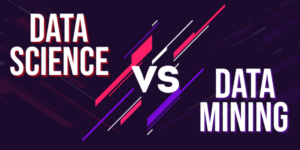
In the era of big data and advanced analytics, terms like data mining and data science are frequently used interchangeably. However, these are distinct concepts, each playing a crucial role in deriving insights from data. In this blog post, We will elucidate the salient distinctions between data science and data mining, exploring their unique contributions to the field of information discovery and decision-making also learning Artificial Intelligence Training in Chennai.
Defining Data Mining and Data Science
Data Mining
Finding patterns, correlations, and trends in big databases is referred to as data mining. It entails taking raw data and applying methods like machine learning, statistical analysis, and pattern recognition to extract useful information. Finding hidden knowledge in the data to help with prediction and decision-making is the aim of data mining.
Data Science
The topic of data science is wide and includes a range of approaches and strategies for deciphering and evaluating complex data. It takes an interdisciplinary approach, fusing aspects of data analysis, machine learning, statistics, and domain knowledge.. Data science aims to extract actionable insights from data, addressing business challenges and informing strategic decision-making.
Key Differences Between Data Mining and Data Science
1. Scope and Purpose
Data Mining: Focuses specifically on extracting patterns and knowledge from data. It is more specialized and targeted, with the primary aim of discovering hidden insights within datasets.
Data Science: Includes a wider variety of tasks, such as data mining. The complete data lifecycle—from data collection and cleaning to analysis and interpretation—is the focus of data science.. It is more holistic and aims to solve complex problems using a variety of techniques.
2. Techniques Used
Data Mining: Primarily employs techniques such as clustering, association rule mining, and anomaly detection. These techniques are geared towards uncovering specific patterns and relationships within data.
Data Science: Utilizes a diverse set of techniques, including statistical analysis, machine learning, data visualization, and predictive modeling. The focus is on employing the most suitable techniques for the specific data and problem at hand.
For those aspiring to delve into the intricacies of data analysis and interpretation, the Data Science Course in Bangalore provides a holistic approach. This course covers various aspects of data science, including data mining, ensuring that individuals gain a well-rounded understanding of the field.
3. Data Processing
Data Mining: Often involves the preprocessing of data to prepare it for analysis. Cleaning and transforming data are crucial steps to ensure the quality and relevance of the patterns discovered.
Data Science: Encompasses the entire data processing pipeline, from gathering and cleaning data to developing features and training models. Data science requires a comprehensive understanding of the data and its context.
Applications in Industry
Finance Sector
In the finance sector, data mining can be employed to detect fraudulent activities and patterns in financial transactions. Data science, on the other hand, can provide a broader understanding of market trends, risk assessment, and portfolio optimization, leveraging various techniques beyond traditional data mining.
Healthcare Industry
In healthcare, data mining may be used to identify patterns in patient records that can aid in disease diagnosis. Data science, however, can contribute to personalized medicine, treatment optimization, and predictive modelling for patient outcomes, utilizing a more comprehensive set of analytical tools.
To navigate the dynamic landscape of data science and its diverse components, individuals often turn to specialized training programs. Courses like Data Science Training in Chennai and Machine Learning Course in Bangalore offer comprehensive curricula, covering key concepts in data analysis, machine learning, and statistical modeling. These programs empower professionals with the skills needed to excel in the field of data science.
In the realm of artificial intelligence, which is closely related to both data mining and data science, training programs such as Artificial Intelligence Training in Chennai equip individuals with the knowledge and expertise to develop intelligent systems. As AI continues to play a transformative role in data-driven decision-making, understanding its principles becomes essential for professionals in the field.
Conclusion
In conclusion, while data mining and data science share commonalities in their pursuit of knowledge discovery from data, they differ in scope, techniques, and objectives. Data mining is a specialized process within the broader field of data science, focusing on uncovering patterns and relationships. Data science, on the other hand, encompasses a more comprehensive approach, utilizing a diverse set of techniques to solve complex problems and extract actionable insights.
Specialized training programs, such as Data Science Training in Chennai, play a crucial role in equipping professionals with the skills needed to navigate the complexities of both data mining and data science. As industries increasingly rely on data-driven strategies, understanding the nuances of these concepts becomes essential for making informed decisions and driving innovation in the dynamic world of data analytics.
